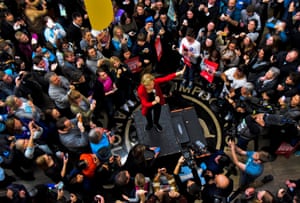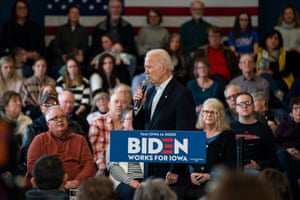Iowa
Polling shows no clear frontrunner in tight race as four Democratic candidates are knotted together at the top

Photograph: Matt Marton/EPA
After more than a year of ideological clashes and policy debates, voters in the midwestern state of Iowa are set to have their say on which Democratic presidential candidate they believe is best positioned to defeat Donald Trump in November’s election.
Hundreds of thousands of Iowans will gather in high school gymnasiums, local libraries and church basements on Monday night to participate in the Iowa caucuses, the first official nominating contest of the 2020 primary race.
Recent polling has provided a consistent snapshot in the closing weeks of a tight race with no clear frontrunner. Four of the eleven remaining Democratic candidates are knotted together at the top – former vice-president Joe Biden, Vermont senator Bernie Sanders, Massachusetts senator Elizabeth Warren and former mayor Pete Buttigieg – and more than half of caucus-goers say they are still open to changing their minds.
Q&AWhat are the Iowa caucuses?

On 3 February, the midwestern state of Iowa will kick off the long process of choosing the Democratic party’s presidential nominee, who will take on Donald Trump in the US election in November.
Most US states hold primary elections, in which voters go to a polling place, mail in their ballots or otherwise vote remotely. But a handful of states hold caucuses – complicated, hours-long meetings with multiple rounds of balloting until one candidate emerges as victor.
Both Democratic and Republican caucuses will take place on 3 February. But because Trump doesn’t face any serious Republican challengers, all eyes will be on the Democratic contest.
Put simply, Iowans aged 18 (at the time of the November 3 election) and over who are registered Democrats will gather in caucus sites (school gyms, churches, community halls) in their designated precinct, and vote with their feet by splitting into groups based on their preferred candidate.
Once voting is over at a caucus site, the support for viable candidates (those with more than 15% of the votes) is translated into a number of “state delegate equivalents”. That result is used to calculate the number of national delegates each candidate receives. National delegates eventually choose the nominee at the Democratic convention in July.
On the night, the candidate with the most SDEs is considered the winner.
Iowans famously take this responsibility seriously, and since 2000, every Democratic winner of the Iowa caucuses has gone on to win the party’s nomination. But the prospect of four more years of a president Democratic voters view as singularly dangerous has added to the pressure. Their choice will reward one candidate – or possibly multiple – an early advantage as they compete in primaries across the rest of the nation.
After a yearlong leadup shaped by ideological clashes and a contest of ideas over issues of healthcare, climate change and income inequality, the leading candidates spent the weekend crisscrossing the state to make their final appeals.
“I respectfully suggest, not because I’m running, but because of the man who’s president, you’ve never had a greater responsibility than you have today,” Biden told a crowd of more than a thousand people his at his final campaign rally on Sunday in a Des Moines middle school gym.

Biden has pitched himself as a steady pair of hands and the strongest choice against Trump, a view that polling suggests is shared by a large constituency of Democrats, particularly among African American voters who play a critical role in later primary contests. But he faces competition for moderate voters from Buttigieg, the 38-year-old former mayor of South Bend, Indiana, who has risen from relative anonymity to the top of the field.
“In looking at the lessons of history, our party wins when we have a nominee who is looking to the future,” Buttigieg told reporters in English – and in French – on Saturday drawing a thinly veiled distinction between himself and the rest of the leading candidates, all of whom are older than 70.
Warren, a former public school teacher and Harvard law professor turned senator, has pitched herself as an unabashed liberal with an arsenal of detailed policy proposals for “big structural change”. But in recent days she’s sought to emphasize what her allies argue is her unique capacity to unite and excite Democrats from both ideological factions as she also confronts doubts that a woman can beat Trump.
“We will – we must – come together as a party and defeat Donald Trump,” Warren told voters at a gymnasium in Cedar Rapids. “And I’ve got a plan for that.”
On Saturday night, Sanders, whose 2016 presidential campaign helped reshape the policy debate on the left, held a concert in Cedar Rapids with musical guest star Vampire Weekend. The event drew more than 3,000 people, according to the campaign, which claimed it was the “largest rally any presidential candidate has held in Iowa this cycle” and a sign of their building momentum. Recent polling shows the Vermont senator has consolidated support among the party’s most liberal voters and edges past his rivals in state and national surveys.
Q&AWhy are the Iowa caucuses important?
On 3 February, voters in the midwestern state of Iowa will kick off the long process that will eventually choose the Democratic party’s presidential nominee, who will take on Donald Trump in November’s US election.
The primaries and caucuses are a series of contests, in all 50 US states plus Washington DC and outlying territories, by which each party selects its presidential nominee.
Iowa is extremely influential in US elections because, since 1972, it has voted first. After months of campaigning, this will be the first chance to see what support each of the presidential candidates actually have among voters.
Winning Iowa matters because it can give candidates a huge boost in momentum and name recognition before the other states cast their votes. Underdogs can triumph, and frontrunners can fall. Since 2000, every Democratic winner of the Iowa caucuses has gone on to win the party’s nomination.
However, Iowa only has a population of around three million people, who are 90% white, which has prompted criticism that its influence in US elections is outsized.
Amy Klobuchar, the senator from Minnesota, is seen as a potential wild card. She has staked her candidacy on a strong showing in Iowa, where she has argued her midwestern appeal and moderate approach can win back voters who abandoned the party in 2016. If she fails to reach the 15% threshold for viability to earn delegates in the caucuses, her supporters could play a decisive role in determining the evening’s winner.
Meanwhile, tech entrepreneur Andrew Yang predicted that his performance in the caucuses would “shock” the nation. And not contesting in Iowa is former New York mayor and billionaire, Michael Bloomberg, who has already spent more than $100m on a gamble that he will win big in later contests.
The impeachment of Trump upended travel for Sanders, Warren and Klobuchar, who were required to be in Washington during the Senate trial, where Republicans are poised to acquit the president this week. That leaves the fate of the presidency in the hands of the nearly one dozen Democratic hopefuls left in the race.
“If the Senate is the jury right now, we are the jury tomorrow,” Buttigieg said in an appearance on Meet the Press on Sunday. “However frustrating it is to watch that process, you can’t switch it off, you can’t walk away, and you can’t give up.”
Republican caucuses will also take place on Monday night, but as Trump faces no serious challengers for the nomination, all eyes will be on Democrats. In a bit to take back some of the limelight, White House officials, cabinet secretaries, members of Congress and Christian evangelicals will be in the Hawkeye state on Monday to offer voters a stark reminder of who and what the Democratic candidate will be up against.
“This will be the strongest, best-funded, and most organized presidential campaign in history,” said Brad Parscale, Trump 2020 campaign manager, last week. “We are putting the Democrats on notice – good luck trying to keep up with this formidable re-election machine.”
Additional reporting: David Smith in Des Moines
Source: Elections - theguardian.com



